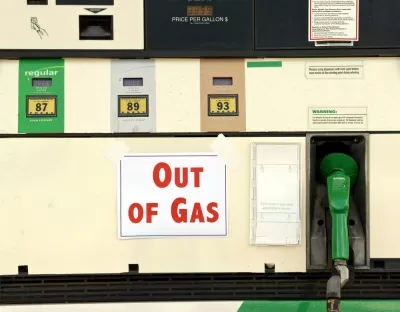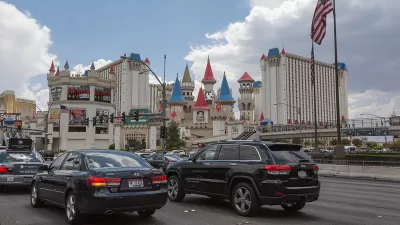Gas prices are 80 cents a gallon less than a year ago and $1.50 less than April 2014. With this amount of savings, the economy should be improving from all the extra cash in consumers' hands. You'll be surprised where much of the savings is going.

"Here's a funny one: Americans have spent their gas savings on gas," writes Myles Udland for Business Insider. According to new figures on spending released last week by the Department of Commerce's Bureau of Economic Analysis (pdf) last week, "inflation-adjusted personal consumption expenditures on gasoline rose 4.1% over the prior year, the most in at least 15 years."
What's surprising is what Udland doesn't attribute the increase to. No mention of driving more, or switching to gas-thirsty SUVs from compact cars, though I suspect both play a role, but I'm getting ahead of myself.
Udland wasn't surprised at the increase in gasoline spending as he anticipated it in a column he wrote in September. "The last time oil prices crashed and brought down the price of gas, US consumers spent more money on gas," he wrote.
According to behavioral economist Richard Thaler, "households typically have rigid 'buckets' of spending — $80 per week on food, $100 on gas, $500 for a mortgage, and so on. Humans tend to stick to their buckets," wrote Udland.
Thaler found that "(t)he shift toward higher grades of gasoline was fourteen times greater than would be expected in a world in which money is treated as fungible."
What's more, upgrading to "premium" was not found in other 'budgets' such as particular food items. "The one exception to that tendency was more splurging on upscale gasoline." [Emphasis is Udland's.]
Udland continues in the Sept. 5 column to indicate where the gas savings have gone—primarily increased savings, as opposed to retail sales other than gasoline.
Hat tip to Loren Spiekerman.
FULL STORY: Americans saved money on gas and then spent those savings on gas

Alabama: Trump Terminates Settlements for Black Communities Harmed By Raw Sewage
Trump deemed the landmark civil rights agreement “illegal DEI and environmental justice policy.”

Study: Maui’s Plan to Convert Vacation Rentals to Long-Term Housing Could Cause Nearly $1 Billion Economic Loss
The plan would reduce visitor accommodation by 25% resulting in 1,900 jobs lost.

Planetizen Federal Action Tracker
A weekly monitor of how Trump’s orders and actions are impacting planners and planning in America.

Waymo Gets Permission to Map SF’s Market Street
If allowed to operate on the traffic-restricted street, Waymo’s autonomous taxis would have a leg up over ride-hailing competitors — and counter the city’s efforts to grow bike and pedestrian on the thoroughfare.

Parklet Symposium Highlights the Success of Shared Spaces
Parklets got a boost during the Covid-19 pandemic, when the concept was translated to outdoor dining programs that offered restaurants a lifeline during the shutdown.

Federal Homelessness Agency Places Entire Staff on Leave
The U.S. Interagency Council on Homelessness is the only federal agency dedicated to preventing and ending homelessness.
Urban Design for Planners 1: Software Tools
This six-course series explores essential urban design concepts using open source software and equips planners with the tools they need to participate fully in the urban design process.
Planning for Universal Design
Learn the tools for implementing Universal Design in planning regulations.
Caltrans
Smith Gee Studio
Institute for Housing and Urban Development Studies (IHS)
City of Grandview
Harvard GSD Executive Education
Toledo-Lucas County Plan Commissions
Salt Lake City
NYU Wagner Graduate School of Public Service



























